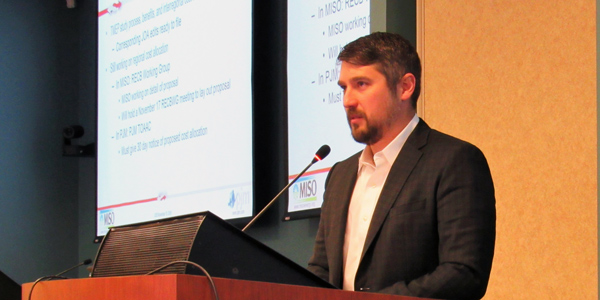By Amanda Durish Cook
CARMEL, Ind. — MISO’s Steering Committee last week advanced three topics for discussion: the RTO’s settlement with SPP, a potential cost recovery defect and potential cost-sharing for customer-funded upgrades.
The committee decided that the Market Subcommittee will discuss a possible cost recovery gap, an issue raised by Entergy. The gap arises when MISO decommits or manually redispatches a resource to offline status, the utility contends.
“If the resource is later brought back online to fulfill the remainder of an existing commitment period or to meet a subsequent commitment period, the resource is not guaranteed start-up cost recovery,” Entergy said.
The company wants the RTO’s Tariff revised “to provide incentive for resources to follow MISO instructions and to ensure that a resource owner is not forced to choose between following MISO instructions and incurring an uncompensated cost, and disregarding MISO instructions.”
A discussion on generator-funded upgrades that benefit other interconnection customers was assigned to MISO’s Regional Expansion Criteria and Benefits Working Group (RECBWG), despite a request by EDF Renewables that the topic be directed to the Interconnection Process Task Force (IPTF). The company wants such projects to receive some reimbursement through MISO, EDF said.
Jeff Webb, MISO director of planning, said the IPTF would be appropriate if project costs were only to be shared among interconnection customers, but he doubted that cost-sharing would be that limited. He suggested that the RECBWG first discuss the potential scope for cost allocation.
A stakeholder discussion on metrics used for the SPP-MISO transmission cost allocation settlement will initially be assigned to the Resource Adequacy Subcommittee for an examination of possible capacity benefits.
Jesse Moser, MISO director of seams relations and strategy, said internal decisions on the metrics belong in the RECBWG, which is already considering broader cost allocation changes. Still, some stakeholders contended that the issue should first move into the RASC for exploration of potential capacity benefits from the settlement.
The settlement requires MISO to “conduct a stakeholder discussion regarding the use of capacity benefits as an alternative way to allocate costs” of the joint operating agreement (ER14-1736). (See “Cost Allocation Set in MISO-SPP Settlement,” MISO Market Subcommittee Briefs.)
Madison Gas and Electric’s Megan Wisersky said she was surprised to learn MISO would delve into a cost allocation discussion before assessing the resource adequacy impacts of the settlement.
Indiana Utility Regulatory Commission staffer Dave Johnston said the topic should be discussed in the RASC.
“To me, RECBWG is for transmission projects,” Johnston said. “This is not what this is. This is a settlement between parties with a bucket of money.”





